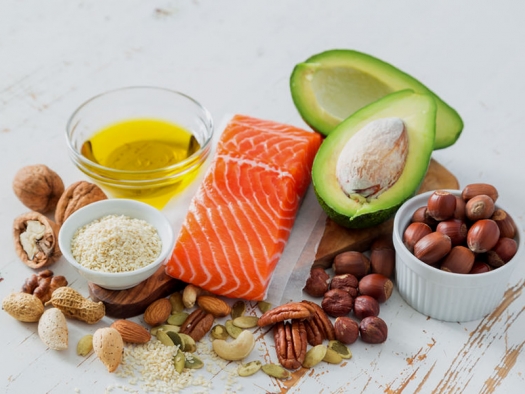Peggy Sarlin's Awakening from Alzheimer's interview with Dr. Dominic D'Agostino
KetogenicDietSalmonNutsAvocadoOil.jpg

Photo by Oleksandra Naumenko, ©2018 / 123rf.com
For years it was believed the brain’s only fuel was sugars in the form of glucose. We now know the brain can use ketone bodies for energy. As we age the brain’s capacity to use sugar declines. It could be burning sugar for fuel actually causes the accumulation of toxic plaques, amyloid beta. However, ketone bodies derived from fats represent an alternative energy source to restore brain metabolism. Our capacity to use ketones increases with age.
A glucose PET scan will be dim if glucose metabolism is impaired and is a typical picture in Alzheimer’s patients. Dr. Dominic D’Agostino’s lab is developing ketone supplements so that people do not need to follow a strict ketogenic diet to get results. These supplements offer ketones at the therapeutic level. He believes the optimal approach includes a low carb, ketogenic diet with ketone supplements.
The ketogenic diet has been around for 90 years. It has many applications in addition to brain health, including cancer and neurological disorders. He emphasized that a diet such as this should be done under a doctor’s supervision and that blood work should be done prior to commencing.
Coconut oil is an example of healthy fat that has medium chain triglycerides (MCT) to elevate ketones. It comes as an oil or a powder (the powder is by Quest Nutrition and is great for travel). He is developing a synthetic and naturally derived ketone ester body that can elevate ketones two to ten times higher than MCT or coconut oil can. These products are called Keto-OS by Pruvit, Kegenix by Kegenix, and Ketopia by ForeverGreen. We don’t have a cure for Alzheimer’s but 30% of the patients with Alzheimer’s respond to this type of therapy.
One on line resource is Ketogenic Diet Resource. To start, try to reduce carbs to 50 gms or less daily. Incorporate healthy fats such as coconut oil, MCT, avocado oil, olive oil and butter. Eat wild caught fish for the omegas, nuts, and supplement with magnesium and potassium citrate. Typically with the ketogenic diet, blood pressure, heart rate, blood glucose, insulin, C-reactive protein, triglycerides, and blood lipids all go down. The ketogenic diet is about 60% fat, 20-30% protein and the balance high fiber carbs in non-white vegetables. It takes a couple of months for the body to adapt to this new metabolic shift. Many benefits are realized in months 2-6 so give it time.


